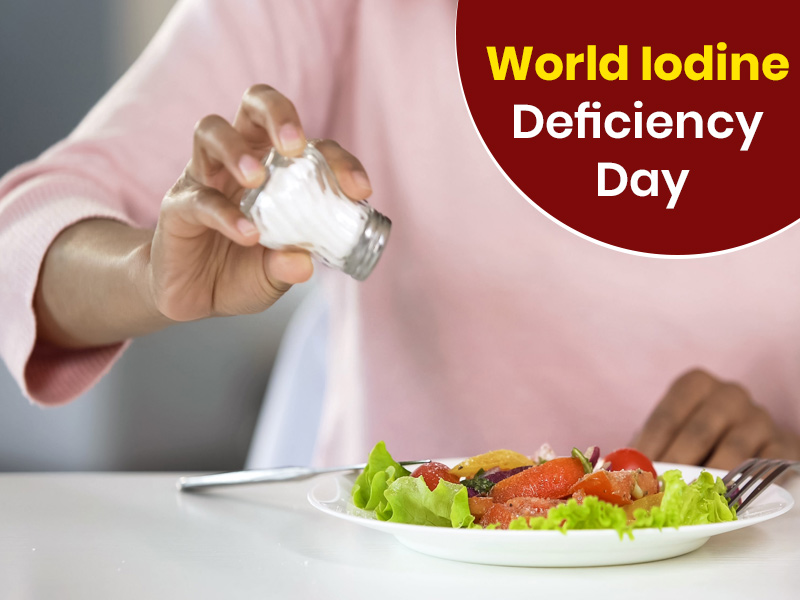
Salt is an essential ingredient that is present in most of our meals and food we eat. Apart from additional salt, there are lots of food items that have natural salt present in them. If you do not take proper intake of salt in the body, you may face iodine deficiency. Iodine deficiency is often neglected by majority of people which leads them to a number of problems. To raise awareness about iodine deficiency, we have come up with campaign on the occasion of World Iodine Deficiency Day. Today we will know about the benefits and risk of having excess salt in our diet.
Table of Content:-
World Iodine Deficiency day is observed on 21st October every year in order to mark the importance of iodine in our diet. Iodine which is primarily present in salt actually improves thyroid function, helps in brain development and prevents iodine related disorders. A study published by Indian Journal of Medical Research in 2003 said that around 29% of people in India have iodine deficiency of some level which is usually due to lack of salt intake in their regular diet.

How Much Salt Is Beneficial?
We have Ms. Ankita Pathak, Consultant Dietician from Vozart Healthcare Hospital, Kanpur to know about importance of salt in diet. She says that salt should actually be an essential ingredient because it is the main source of iodine in the body. Almost all the recipes we prepare in our daily routine has salt it however everyone has a different taste. Some keep it too low and some like it in generous quantity.
The fact is low intake of salt can cause iodine deficiency leading to number of problems whereas more than necessary about of iodine also damages some important body functions. Excess of salt can increase water retention in body; you may have cardiovascular issue and osteoporosis, etc. Therefore it is important to understand that iodine must be taken in correct quantity. An average person should take around 5 grams in a day, more than this may result to health problems.
Benefits of Having Salt
1. Helps to improve Thyroid functions
Thyroid plays a key role in determining the metabolism rate in the body. For thyroid functions to work efficiently it is important to have adequate amount of iodine in the body in form of salt. This increases mineral iodine in the body, lack of which can cause thyroid disorder or problems related to thyroid hormone. Hence salt is beneficial in maintaining thyroid functions.

2. Keeps the body hydrated
Salt also helps to maintain hydration in the body, it balances electrolytes which are necessary for organs to function efficiently. Salt is beneficial for your cells, muscles, and tissues because it maintains water levels inside the body and prevents a person from getting dehydrated. Iodine deficiency could actually lead to dehydration instantly and it can cause cramps, dizziness and fatigue in the body.
3. Prevents Low Blood Pressure
Consuming adequate amount of salt also decreases the chances of low blood pressure. It can be very risky and dangerous for your health if the parameters go below 90/60 mmhg graph. Low blood pressure because of iodine deficiency can result to fainting, blurry vision, nausea and dizziness. Therefore having salt in diet becomes very important for blood pressure as well.
Also Read- How To Improve Your Iodine Deficiency?
4. Improves Cystic Fibrosis
People having cystic fibrosis actually loose salt in their body more often and hence they need larger amount of iodine in their body. An average person needs around 5 gram of salt whereas a person suffering from cystic fibrosis may need around 7 grams of salt per day. Hence more water and salt in their diet becomes necessary for them. Rest depending on the situation, the consumption may vary.
Risk of Having Excess Salt in Diet
1. Damages Cardiovascular Health
Excess of salt in the body can affect your heart and blood vessels. It can increase blood pressure in the body as result to heart attack and stroke. It is important to keep salt and water quantity in check in order to prevent cardiovascular problems especially when you are consuming high sodium diet with low potassium diet. Damage of blood vessels or affect on cardiovascular system can lead to prolonged illness and disorders.
2. Increases Water Retention

If you have too much salt in the diet, then it may filter out sodium from your blood vessels. Because of this it may affect the body’s ability to hold excess of water in order to dilute sodium components. This leads to water retention in the body and bloating which might be symptoms of other health problems as well. Therefore excess salt in diet can also harm the body in similar way as low iodine consumption does.
Also Read- Know your Tongue: 7 ‘Tongtastic’ Facts That You Need To Know
3. Increases risk of having Osteoporosis
Another problem associated with having excess amount of salt in diet is because of high risk of osteoporosis. Since having more salt decreases calcium inside the body, it makes the body take calcium from other sources present in the body such as bones. Because of this, it makes the bones brittle and increases the risk of having osteoporosis. Hence salt consumption should be taken very seriously in order to prevent these problems.
Read More Articles on Mind And Body
Picture Credits- Pexels.com
Also watch this video
How we keep this article up to date:
We work with experts and keep a close eye on the latest in health and wellness. Whenever there is a new research or helpful information, we update our articles with accurate and useful advice.
Current Version